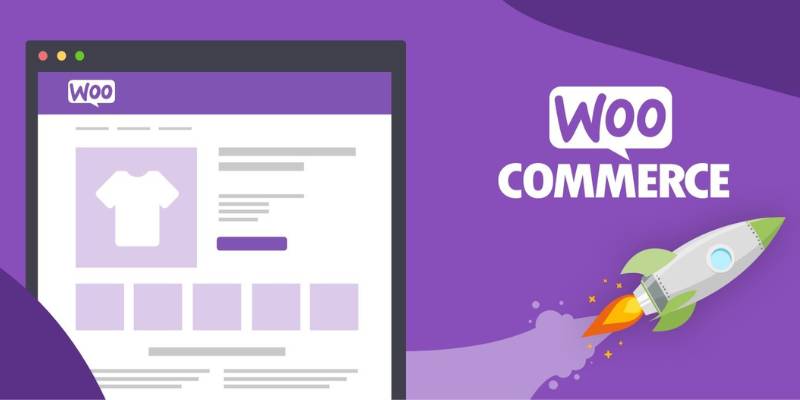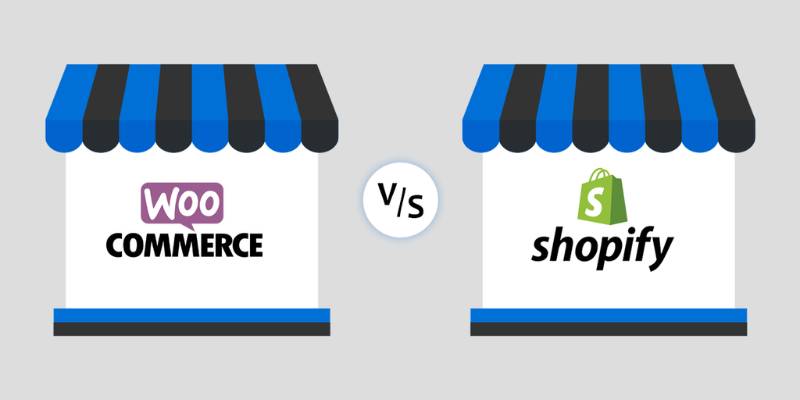Shopify Vs. WooCommerce: Best eCommerce Website Builder 2025
Advertisement
In 2025, choosing the right eCommerce website builder is crucial for your business's online success. With many options available, two major contenders stand out: Shopify and WooCommerce. Shopify is a fully hosted solution, offering ease of use and support, while WooCommerce, a plugin for WordPress, provides flexibility and customization for users with technical know-how.
Both platforms have advantages and challenges, making it important to understand which suits your business needs. This article will explore each platform's key features, benefits, and considerations, helping you make an informed decision.
Shopify:
Shopify is a fully hosted eCommerce platform, which means it takes care of everything for you. You can set up your store in just a few hours, choose from various themes, and start selling without worrying about technical details like hosting or server management. Shopify suits businesses that want an easy, user-friendly setup without diving into complex technical issues.

WooCommerce:
WooCommerce, built as a plugin for WordPress, is an open-source solution. Unlike Shopify, WooCommerce gives you complete control over your website, allowing for more customization options. However, managing hosting, security, and maintenance requires you. WooCommerce is ideal for businesses that already use WordPress or want complete flexibility with their online store's design and functionality.

Shopify Vs. WooCommerce: Key Differences
Both Shopify and WooCommerce allow you to create an e-commerce store, but they approach the process differently. Shopify is a hosted platform, which means it takes care of all the technical aspects, such as hosting, security, and software updates. WooCommerce, on the other hand, is a plugin for WordPress, meaning it gives you full control over your website but requires you to handle hosting and other technical aspects yourself.
Ease of Use: Which Platform Is Simpler?
Shopify:
Shopify is known for its ease of use. As a hosted solution, it takes care of all the technical aspects, so you can focus solely on setting up your store and products. With drag-and-drop functionality and a user-friendly interface, Shopify is perfect for beginners or businesses that want to get their store up and running quickly.
WooCommerce:
WooCommerce offers more flexibility but can be complex for beginners. Since it's built on WordPress, you'll need some technical knowledge to set up your website, install plugins, and manage hosting. However, for businesses already familiar with WordPress, WooCommerce can be relatively easy to use and offers more freedom when it comes to customization.
Design and Customization Options:
Shopify:
Shopify offers a range of professionally designed themes, all mobile-friendly and easy to customize. While the themes look great, Shopify's customization options are more limited than WooCommerce's. However, the themes are sufficient for most users, and additional functionality can be added through apps.
WooCommerce:
One of WooCommerce's biggest advantages is its customization capabilities. Since WooCommerce is open-source, you have full control over the design and functionality of your store. You can use a pre-built WordPress theme or create a custom design. This level of customization makes WooCommerce ideal for businesses with specific design or functionality requirements.
Pricing: Which Platform Is More Cost-Effective?
Shopify:
Shopify is a subscription-based platform with pricing plans starting at $29 monthly in 2025. This includes hosting, security, and software updates, but additional costs may apply if you add premium themes or apps or use third-party payment gateways. Shopify's straightforward pricing structure, but costs can add up depending on your desired features.
WooCommerce:
WooCommerce is free, but you must pay for web hosting, domain registration, and premium themes or plugins. Hosting for WooCommerce can range from $5 to $50 per month, depending on your needs. Additionally, you may incur costs for premium features like advanced analytics or payment gateway integrations. Overall, WooCommerce is more flexible in pricing, but it can be more complex to estimate total costs compared to Shopify.
Payment Options and Transaction Fees:
Shopify:
Shopify supports a variety of payment gateways, including its payment system, Shopify Payments, which is integrated directly into the platform. You can avoid transaction fees when using Shopify Payments, but if you choose a third-party gateway, Shopify charges an additional 2% fee. This is something to remember when calculating the cost of running your store on Shopify.
WooCommerce:
WooCommerce doesn't charge transaction fees; you must set up your payment gateway. WooCommerce integrates with many payment processors, including PayPal, Stripe, and Authorize.net, giving you much flexibility. However, some payment processors charge transaction fees, so you must account for these costs when using WooCommerce.
SEO and Marketing Features:
Shopify:
Shopify has built-in SEO features that help optimize your store for search engines, including customizable title tags, meta descriptions, and URL structures. Additionally, Shopify offers a range of marketing tools, such as email campaigns, discounts, and social media integration. However, Shopify's SEO features are somewhat limited compared to WooCommerce, and you may need to use third-party apps to optimize your store fully.
WooCommerce:
WooCommerce is built on WordPress, one of the best SEO platforms. You have full control over every aspect of your store's SEO, from on-page elements like title tags and meta descriptions to more advanced features like structured data. Additionally, WooCommerce offers a range of SEO plugins, such as Yoast SEO, to help you optimize your store for search engines.
Which Is Best for You in 2025?
The choice between Shopify and WooCommerce depends largely on your business needs, technical expertise, and budget:
Choose Shopify if you want a simple, hassle-free solution with a user-friendly interface and reliable customer support. It's perfect for those who wish to launch a store quickly without worrying about technical aspects.
Choose WooCommerce if you need full control over your store's design and functionality. Suppose you're already familiar with WordPress or have specific customization needs. In that case, WooCommerce may be the best option. Both platforms are excellent choices for building a successful eCommerce store. Still, in 2025, Shopify's ease of use and all-in-one service will make it the go-to option for many businesses. On the other hand, WooCommerce's flexibility and advanced customization options make it a top choice for those who need full control over their online store.
Conclusion
Choosing between Shopify and WooCommerce ultimately comes down to your business's needs. Shopify offers a streamlined, easy-to-use platform perfect for users who want to get their store up and running quickly, with minimal technical effort.
WooCommerce, on the other hand, provides the flexibility and control needed for businesses looking to create a fully customized store. Considering your budget, technical expertise, and business goals, you can confidently select the best platform for your e-commerce business in 2025.
On this page
Shopify: WooCommerce: Shopify Vs. WooCommerce: Key Differences Ease of Use: Which Platform Is Simpler? Design and Customization Options: Pricing: Which Platform Is More Cost-Effective? Payment Options and Transaction Fees: SEO and Marketing Features: Which Is Best for You in 2025? ConclusionAdvertisement
Related Articles

Airtable Vs. Trello in 2025: A Complete Guide to Pros, Cons, and Best Uses

Google Sheets vs. Excel: A Simple 2025 Comparison

Best AI Image Editors to Transform Your Photos in Minutes

Best Free Video Editing Software for Beginners in 2025

SurveyMonkey Vs. Google Forms: Which Survey Tool is Best for 2025?

Top 8 Screen Recorder Apps for Effortless Video Recording

Revolutionize Your Workflow with These AI Productivity Tools in 2025

ClickFunnels Vs. Kajabi: Which Tool Works Best in 2025?

Top Sony Vegas Plugins to Enhance Your Video Editing Experience

Building Trust: Ethical Principles in Online Tool Development

The Top AI Text Generators Every Writer and Creator Should Know

 knacksnews
knacksnews